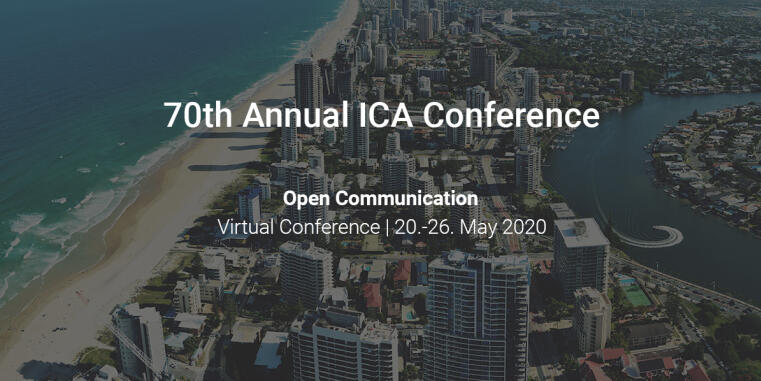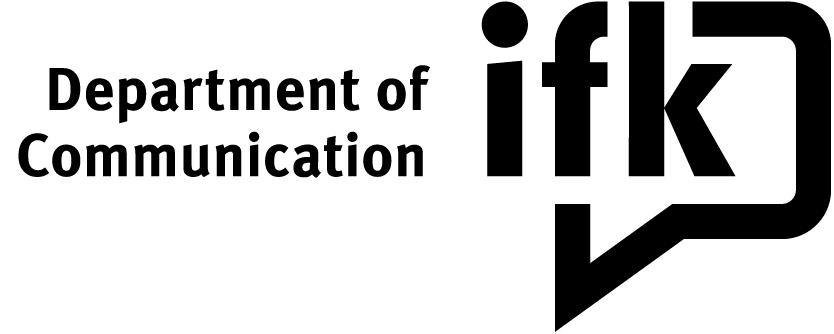
IfK Represented With 14 Contributions at the 70th Annual ICA Conference
(25.05.2020) This year's 70th Annual Conference of the International Communication Association (ICA) with the main topic "Open Communication" will take place from 20-26 May as a virtual conference. Researchers* from the Münster Department of Communication will be represented with 14 contributions.
Under the title "Open Communication", this year's ICA Annual Conference will focus on the Open Science movement and its significance for the field of communication science research.
Open Science is a concept that aims to advance science by promoting transparency and collaboration in the research process and the creation of publicly accessible knowledge. This can be done, for example, by publishing interim results and data sets, or by opening up the scientific process, for example through public participation.
The ICA Annual Conference would like to encourage an exchange on how best practices can be developed and experiences about "Open Communication Science" can be shared in order to further increase both the quality of research and the transparency of research processes in communication science.
The ICA would like to encourage contributions and panels with collaboration between different research areas and practices and adjacent disciplines; in particular, contributions focusing on digital communication, platform lockdown, and interesting tensions between practices in data science and open science.
With 11 pre- and post-conferences, the conference will take place from 20 to 26 May. Among the accepted papers for this year's conference are 14 contributions by or with participation of IfK scientists*:
- A Cross-Lagged Panel Study on Online Sexual Victimization and Psychosocial Well-Being
Ruth Festl; Felix Reer; Thorsten Quandt - Still Images - Moving People? The Impact of Digital Media Images on Political Participation Online
Stephanie Geise; Axel Heck; Diana Panke - The Normativity of Communication and Its Subfields: A Content Analysis on Normative Claims in Peer-Reviewed Journal Articles (1970-2014)
Stephanie Geise; Katharina Kleinen von Königslöw; Ulrike Klinger; Melanie Magin; Kathrin F. Müller; Cordula Nitsch; Claudia Riesmeyer; Liane Rothenberger; Christina Schumann; Annika Sehl; Cornelia Wallner; Arne F. Zillich - To Give or Not to Give: Examining the Prosocial Effect of a 360° Video Documentary on the Refugee Crisis
Robin Janzik; Lars-Ole Wehden; Felix Reer; Wai Yen Tang; Thorsten Quandt - Assessing Strategies for Topic Modeling of Multilingual Text Collections in Communication Research
Daniel Maier; Christian Baden; Daniela Stoltenberg; Maya de Vries; Annie Waldherr - Dark Personality Traits and Social Media Disorder: The Mediating Role of Social Media Use Motives
Felix Reer; Wai Yen Tang; Thorsten Quandt - How Gamer Identity and Sense of Community Online Are Related to Psychosocial Well-Being and Gaming Disorder Scores
Felix Reer; Wai Yen Tang; Thorsten Quandt - Virtual Reality Technology and Game Enjoyment: A Self-Determination Theory Perspective
Felix Reer; Lars-Ole Wehden; Robin Janzik; Wai Yen Tang; Thorsten Quandt - Hidden Biases: The Effects of Deleted Content on Twitter on Sampling Quality
Tim Schatto-Eckrodt; Svenja Boberg; Lena Frischlich; Florian Wintterlin; Thorsten Quandt - The EU Election 2019 on Social Media: Comparing Alternative and Mainstream News Using Computational Methods
Tim Schatto-Eckrodt; Lena Frischlich; L. Clever - Denunciation, Corrective or Catchphrase? The Use of the Term Fake News in Social Media Debates
Tim Schatto-Eckrodt; Svenja Boberg; Florian Wintterlin; Thorsten Quandt - Open Access and the Field of Communication: The Struggle Is Real
David Park; Cheryll Ruth R. Soriano; Xiang Ren; Carol A. Stabile; Hart Cohen; Anthony Fung; Andreas M. Scheu; Jefferson D. Pooley - Perceptions of Trustworthiness and Risk: How Transparency Can Influence Trust in Journalism
Bernadette S. Uth; Laura Badura; Bernd Blöbaum - Addicted to Cybersex? A Representative Study on the Disordered Use of Sexual Online Content
Lars-Ole Wehden; Felix Reer; Robin Janzik; Thorsten Quandt
The International Communication Association (ICA) was founded in 1950 and is associated with the United Nations as a non-governmental organization (NGO) since 2003. As a professional association with its headquarters in Washington D.C. and currently over 4.500 Members from 85 countries, the ICA is one of the most important scientific platforms for media- and communication research. The next annual conference 2021 will be held in Denver, Colorado (USA).

